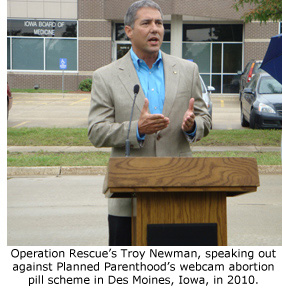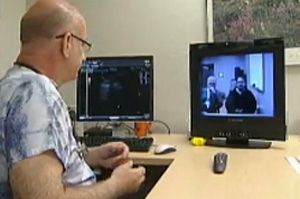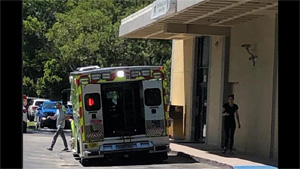By Cheryl Sullenger
 Des Moines, IA – Polk County District Judge Jeffrey Farrell ruled today that the Iowa Board of Medicine was acting within its proper authority when it banned the use of Planned Parenthood’s experimental “Webcam” abortion pill distribution process. This ruling will allow the implementation and enforcement of the webcam abortion ban in 30 days.
Des Moines, IA – Polk County District Judge Jeffrey Farrell ruled today that the Iowa Board of Medicine was acting within its proper authority when it banned the use of Planned Parenthood’s experimental “Webcam” abortion pill distribution process. This ruling will allow the implementation and enforcement of the webcam abortion ban in 30 days.
Planned Parenthood has said it will appeal today’s ruling.
“Operation Rescue has worked with other state and national pro-life groups since 2010 to bring an end to this dangerous abortion pill distribution racket that puts Planned Parenthood profits above the lives and health of women,” said Troy Newman, President of Operation Rescue. “Today represents a long awaited victory for women and their babies.”
Webcam abortions enable an abortionist to remotely dispense abortion pills to patients in other cities without leaving a central office. The abortionist visits briefly for a short time with a patient via an internet video conferencing system then clicks a button on his computer that remotely opens a drawer in front of the patient containing the abortion pills.
The Board found that the lack of a physical examination by the dispensing abortionist fell well below patient care standards.
A report by the Des Moines Register elaborated:
The judge wrote that the board cited “legitimate reasons” to require physicians to perform an in-person physical examination before prescribing the abortion pills. He also wrote that if the procedure is no longer offered at satellite clinics, rural Iowa women would have to travel farther to obtain abortions, but he said this would not cause “undue hardship.”
However, despite Planned Parenthood’s claims, the outlying facilities operated by Planned Parenthood that currently use the dubious abortion pill distribution scheme are located in Iowa cities that have ample legitimate medical services available and are not in “rural” areas as Planned Parenthood claims.
In recent months, Planned Parenthood has voluntarily shut down webcam abortions in ten facilities. Nine offices still employ the now-banned pill distribution process.
Operation Rescue brought the webcam abortions to light after an undercover investigation in March, 2010, then exposed plans by Planned Parenthood Federation of America to expand the scheme into every one of their clinics nationwide, ironically during a protest of a Planned Parenthood fundraiser in Cedar Rapids. This would have represented the largest expansion of abortion since Roe v. Wade.
Since Planned Parenthood’s plans became public, 14 states have passed restrictions that require a licensed physician be present when abortion pills are dispensed, effectively banning the process of webcam abortion process. The planned national expansion of the webcam system has since been scuttled in the wake of the new state laws.
Read the Ruling






